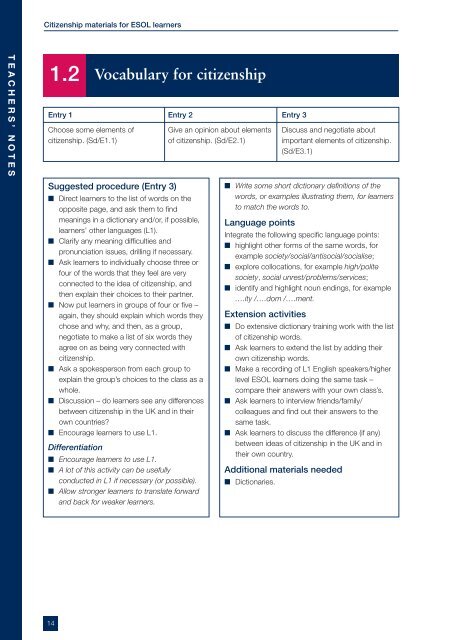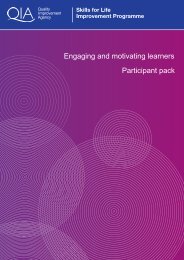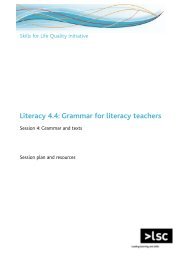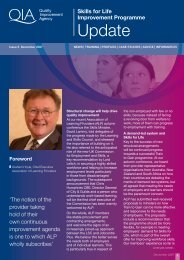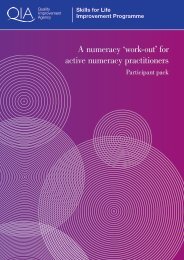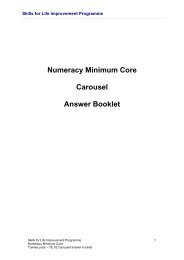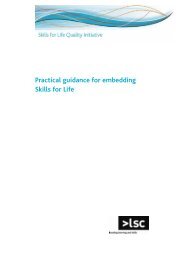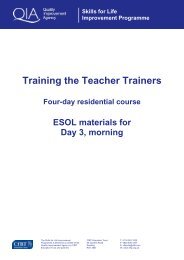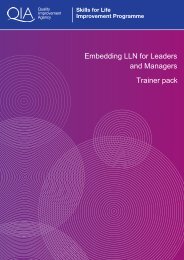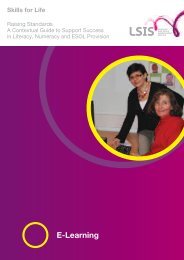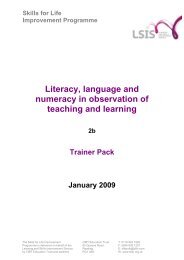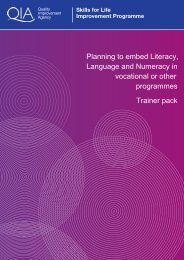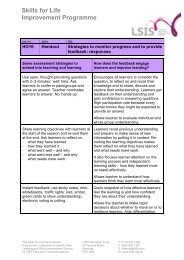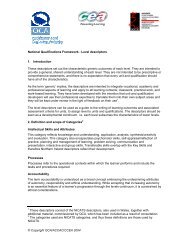Citizenship Materials full pack - Skills for Life Improvement Programme
Citizenship Materials full pack - Skills for Life Improvement Programme
Citizenship Materials full pack - Skills for Life Improvement Programme
You also want an ePaper? Increase the reach of your titles
YUMPU automatically turns print PDFs into web optimized ePapers that Google loves.
<strong>Citizenship</strong> materials <strong>for</strong> ESOL learners<br />
TEACHERS’ NOTES<br />
1.2<br />
Vocabulary <strong>for</strong> citizenship<br />
Entry 1 Entry 2 Entry 3<br />
Choose some elements of<br />
citizenship. (Sd/E1.1)<br />
Suggested procedure (Entry 3)<br />
■ Direct learners to the list of words on the<br />
opposite page, and ask them to find<br />
meanings in a dictionary and/or, if possible,<br />
learners’ other languages (L1).<br />
■ Clarify any meaning difficulties and<br />
pronunciation issues, drilling if necessary.<br />
■ Ask learners to individually choose three or<br />
four of the words that they feel are very<br />
connected to the idea of citizenship, and<br />
then explain their choices to their partner.<br />
■ Now put learners in groups of four or five –<br />
again, they should explain which words they<br />
chose and why, and then, as a group,<br />
negotiate to make a list of six words they<br />
agree on as being very connected with<br />
citizenship.<br />
■ Ask a spokesperson from each group to<br />
explain the group’s choices to the class as a<br />
whole.<br />
■ Discussion – do learners see any differences<br />
between citizenship in the UK and in their<br />
own countries?<br />
■ Encourage learners to use L1.<br />
Differentiation<br />
■ Encourage learners to use L1.<br />
■ A lot of this activity can be use<strong>full</strong>y<br />
conducted in L1 if necessary (or possible).<br />
■ Allow stronger learners to translate <strong>for</strong>ward<br />
and back <strong>for</strong> weaker learners.<br />
Give an opinion about elements<br />
of citizenship. (Sd/E2.1)<br />
Discuss and negotiate about<br />
important elements of citizenship.<br />
(Sd/E3.1)<br />
■ Write some short dictionary definitions of the<br />
words, or examples illustrating them, <strong>for</strong> learners<br />
to match the words to.<br />
Language points<br />
Integrate the following specific language points:<br />
■ highlight other <strong>for</strong>ms of the same words, <strong>for</strong><br />
example society/social/antisocial/socialise;<br />
■ explore collocations, <strong>for</strong> example high/polite<br />
society, social unrest/problems/services;<br />
■ identify and highlight noun endings, <strong>for</strong> example<br />
….ity /….dom /….ment.<br />
Extension activities<br />
■ Do extensive dictionary training work with the list<br />
of citizenship words.<br />
■ Ask learners to extend the list by adding their<br />
own citizenship words.<br />
■ Make a recording of L1 English speakers/higher<br />
level ESOL learners doing the same task –<br />
compare their answers with your own class’s.<br />
■ Ask learners to interview friends/family/<br />
colleagues and find out their answers to the<br />
same task.<br />
■ Ask learners to discuss the difference (if any)<br />
between ideas of citizenship in the UK and in<br />
their own country.<br />
Additional materials needed<br />
■ Dictionaries.<br />
14


